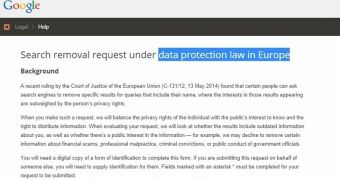Google has already approved more than half of the requests it received and processed under the “right to be forgotten” directive. Since May, tens of thousands of links have been taken down for European users of the site.
According to CNET, the company has admitted to agreeing to remove contents in accordance to more than 50 percent of the requests it processed so far.
The most recent stats, released on July 18, show that Google received 91,000 requests involving more than 328,000 webpages since May. While the hype has died down a bit and requests are not coming at the same rate as they did in the first few days, Google still receives thousands of new forms each day.
On Thursday, Google’s representatives joined those of Microsoft and Yahoo in a meeting with the data regulators in the European Union to set down some ground rules regarding the way these requests are being handled.
The entire situation can be tracked down to a case where the Court of Justice of the European Union ruled in favor of the appellant, saying that Google should, in fact, remove a link that he no longer saw as relevant.
From that day forward, the world’s search engines being used in the European Union could be asked to delete links under the “right to be forgotten” ruling.
The decision has caused some problems for Google and other companies, as they are trying to figure out a way to implement an automated system. So far, Google has had to do things manually, which implicitly means that all decision are greatly subjective.
While the Mountain View company isn’t the only one involved, its search engine handles over 90 percent of European queries, making it the most affected name in the group.
The decision taken by the European Court has been heavily criticized by advocates, who believe this will hinder other people’s rights to knowledge.
On the other hand, there’s a high chance of abuse. Since Google received plenty of requests from people trying to erase reports about their criminal behavior and worse, it is safe to say that the advocates are right in this area.
Google has been doing its best to undermine the power of the ruling by displaying a notice that a link has been removed from a search results page, similar to those that appear following a DMCA takedown. It has also informed the media organizations about their links being taken down, which pushed said newspapers to complain about it and make sure the world knew exactly which articles people wanted hidden.
Furthermore, since the decision only encompasses European nations, Google.com still holds all the links that were taken down on localized versions, and they can be viewed quite easily.

 14 DAY TRIAL //
14 DAY TRIAL //